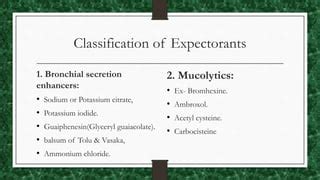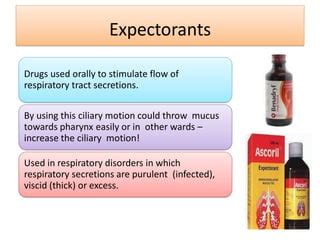Intro
Expectorants help thin mucus, relieving congestion with natural mucolytics, bronchodilators, and cough suppressants to ease respiratory issues.
Expectorants are a type of medication that helps thin and loosen mucus, making it easier to cough up. This can be especially helpful for people who are suffering from respiratory issues such as bronchitis, asthma, or chronic obstructive pulmonary disease (COPD). When mucus is thick and sticky, it can be difficult to expel from the body, which can lead to congestion, coughing, and discomfort. Expectorants work by increasing the amount of water in the mucus, making it thinner and more easily removable from the body.
The importance of thinning mucus cannot be overstated. When mucus is thick and sticky, it can provide a breeding ground for bacteria and other microorganisms, which can lead to infections and further complications. By thinning the mucus, expectorants can help to reduce the risk of infection and promote healing. Additionally, expectorants can help to relieve congestion and coughing, making it easier to breathe and improving overall quality of life.
Expectorants are commonly used to treat a variety of respiratory issues, including the common cold, flu, and bronchitis. They can be found in over-the-counter (OTC) medications such as cough syrups, tablets, and capsules. Some expectorants are also available by prescription, which can be more effective for severe respiratory issues. It's essential to follow the instructions and dosage recommendations when taking expectorants to ensure safe and effective use.
How Expectorants Work

There are several types of expectorants available, including guaifenesin, acetylcysteine, and bromhexine. Guaifenesin is one of the most commonly used expectorants and is found in many OTC medications. It works by increasing the amount of water in the mucus, making it thinner and more easily removable from the body. Acetylcysteine is another type of expectorant that works by breaking down the mucin in the mucus, making it easier to expel from the body. Bromhexine is a more potent expectorant that is often used to treat severe respiratory issues.
Benefits of Expectorants

Some of the key benefits of expectorants include:
- Relieving congestion and coughing
- Reducing the risk of infection
- Promoting healing
- Improving overall quality of life
- Making it easier to breathe
- Reducing the amount of mucus in the body
Expectorants for Specific Respiratory Issues
Expectorants can be used to treat a variety of respiratory issues, including the common cold, flu, and bronchitis. They can also be used to treat more severe respiratory issues such as COPD and asthma. When using expectorants to treat specific respiratory issues, it's essential to follow the instructions and dosage recommendations to ensure safe and effective use.For example, when using expectorants to treat the common cold, it's essential to take the medication as directed and to drink plenty of fluids to help thin the mucus. When using expectorants to treat more severe respiratory issues such as COPD, it's essential to work closely with a healthcare provider to develop a treatment plan that includes expectorants and other medications.
Types of Expectorants

Acetylcysteine is another type of expectorant that works by breaking down the mucin in the mucus, making it easier to expel from the body. Bromhexine is a more potent expectorant that is often used to treat severe respiratory issues. Other types of expectorants include ambroxol, which works by increasing the production of surfactants, and carbocisteine, which works by breaking down the mucin in the mucus.
Some of the key types of expectorants include:
- Guaifenesin
- Acetylcysteine
- Bromhexine
- Ambroxol
- Carbocisteine
Expectorants and Other Medications

When using expectorants with other medications, it's essential to follow the instructions and dosage recommendations to ensure safe and effective use. It's also essential to work closely with a healthcare provider to develop a treatment plan that includes expectorants and other medications.
Some of the key medications that can be used with expectorants include:
- Bronchodilators
- Antibiotics
- Anti-inflammatory medications
- Decongestants
- Cough suppressants
Side Effects of Expectorants

When using expectorants, it's essential to follow the instructions and dosage recommendations to minimize the risk of side effects. It's also essential to work closely with a healthcare provider to monitor for side effects and adjust the treatment plan as needed.
Some of the key side effects of expectorants include:
- Stomach upset
- Nausea
- Vomiting
- Dizziness
- Headache
- Fatigue
- Allergic reactions
- Liver damage
Conclusion and Final Thoughts

When using expectorants, it's essential to follow the instructions and dosage recommendations to ensure safe and effective use. It's also essential to work closely with a healthcare provider to develop a treatment plan that includes expectorants and other medications.
We invite you to share your thoughts and experiences with expectorants in the comments below. Have you used expectorants to treat a respiratory issue? What were your results? Do you have any questions about expectorants or respiratory health? We're here to help and look forward to hearing from you.
What are expectorants and how do they work?
+Expectorants are a type of medication that helps thin and loosen mucus, making it easier to cough up. They work by increasing the amount of water in the mucus, making it thinner and more easily removable from the body.
What are the benefits of using expectorants?
+The benefits of using expectorants include relieving congestion and coughing, reducing the risk of infection, promoting healing, and improving overall quality of life.
What are the side effects of expectorants?
+Expectorants can cause side effects, including stomach upset, nausea, and vomiting. They can also cause dizziness, headache, and fatigue. In rare cases, expectorants can cause more serious side effects, such as allergic reactions and liver damage.
Can expectorants be used with other medications?
+Yes, expectorants can be used with other medications to treat respiratory issues. For example, expectorants can be used with bronchodilators to help open up the airways and make it easier to breathe.
How long does it take for expectorants to work?
+The time it takes for expectorants to work can vary depending on the individual and the specific medication. In general, expectorants can start to work within a few hours of taking the medication.
